This weekend, Sunday 11th November, marks the 100th anniversary of the end of the First World War. In this week’s blog post I have pulled together just a small selection of Library resources, digital and physical, that will help you explore the First World War, the events leading up to it and the aftermath.
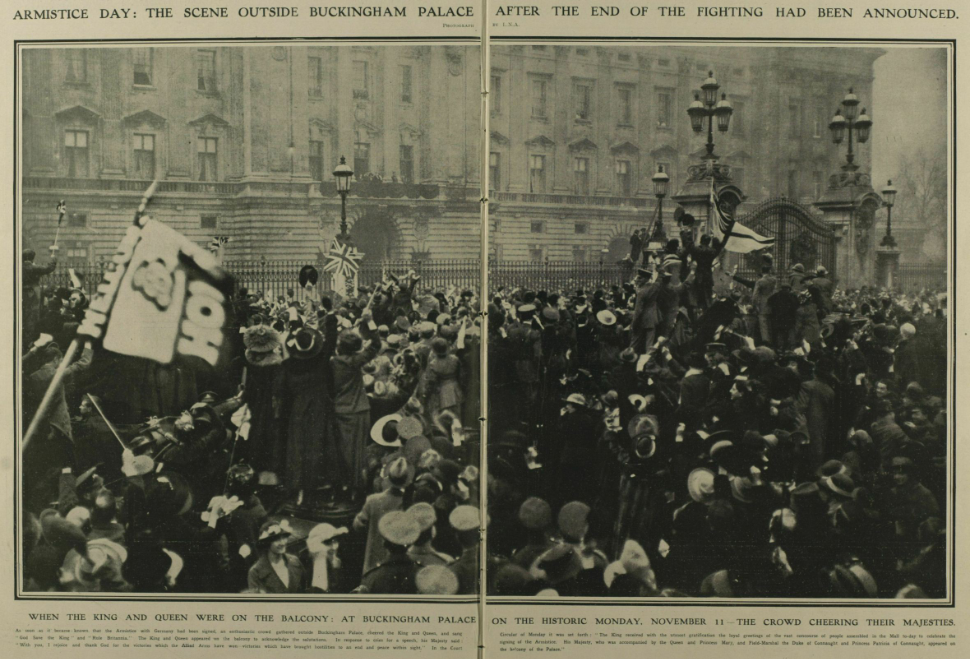
“Armistice Day: The Scene outside Buckingham Palace after the End of the Fighting Had Been Announced.” Illustrated London News [London, England] 16 Nov. 1918: n.p. Available from Illustrated London News Historical Archive.
What did the papers say?
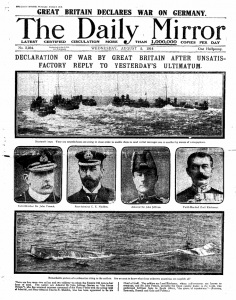
Screenshot of front page from The Daily Mirror, Wednesday, August 5, 1914. Available from UK Press Online.
During the war the British Government tried to strictly control reporting on events, particularly from the front line. Legislation was passed in 1914 which allowed the War Office to censor the press and at first journalists had to go undercover to try and report on what was happening. Even when the Government relented and agreed to send accredited British war correspondents to the front line their reports were still heavily censored and were often overt propaganda, with actual facts about events never being reported (see reporting or non-reporting on the Battle of the Somme as an example).
The Library subscribes to a large number of digitised newspaper archives that will allow you to see what events were being reported on at the time and how they were being reported. Read full text articles, compare how different newspapers were covering the same issues and stories and track coverage of the First World War from the escalating hostilities prior to the outbreak to its conclusion and aftermath.
You can search individual titles, such as The Times, The Scotsman, The Guardian and The Observer, The Daily Mail, The Illustrated London News, etc., or cross-search a range of titles, through databases such as UK Press Online, British Library Newspapers or Irish Newspaper Archive, to examine how events leading up to the outbreak of war, during the war and the consequences of the war were reported on.
Periodicals and magazines from this time can also shed new perspectives on how these events were viewed and reported on, why not try British Periodicals and American Periodicals, which both cover multiple, fully-scanned and searchable titles. Or you could try some of the individual magazine archives, such as Country Life Archive, Harper’s Bazaar Archive or the Vogue Archive for their unique take one events.
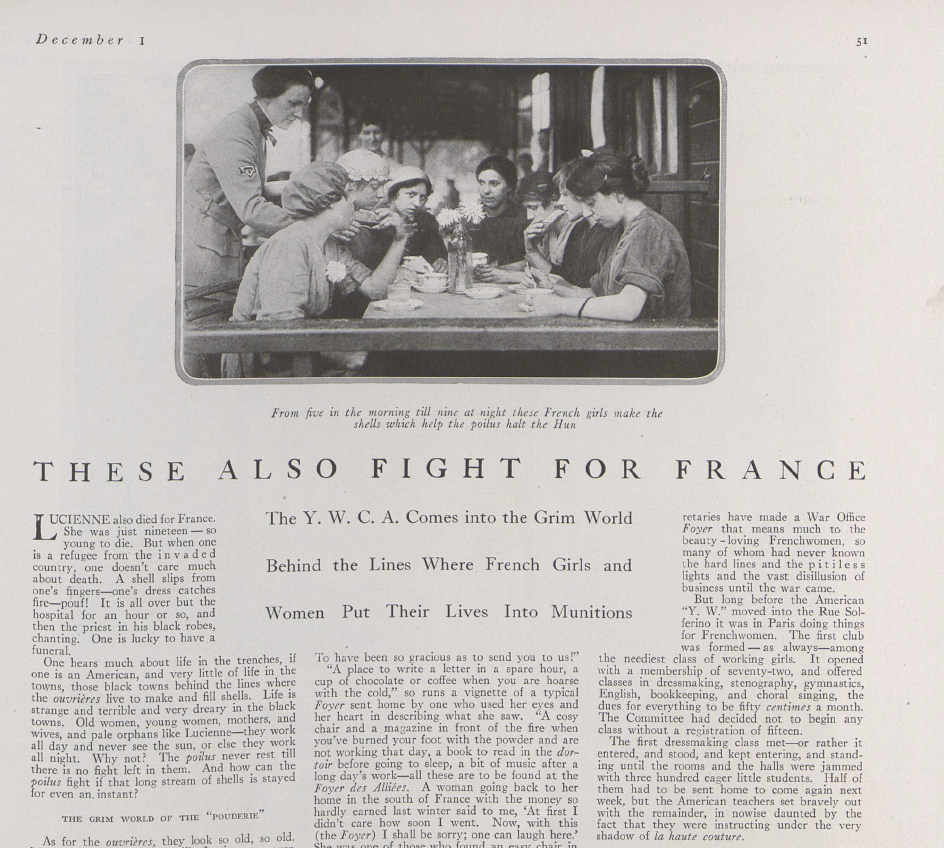
Screenshot from Special Features: These Also Fight For France. Vogue ; New York Vol. 52, Iss. 11, (Dec 1, 1918): 51, 86, 88. Available from The Vogue Archive.
All digitised newspaper and periodicals/magazines archives available via the Library can be accessed from the Newspapers & Magazines database list .
What do the archives tell us?
Primary sources reflect the individual viewpoint of a participant or observer and they enable you to get as close as possible to what actually happened during an historical event or time period. Primary sources can include diaries, correspondence, historical and legal documents, eyewitness accounts, newspaper and magazine articles, statistical data, speeches, audio and video recordings, art objects, etc.
The Library has access to a large range of primary source databases that allow you to search for and view digitised primary source material. Here are just a few you may want to use to find more about the First World War.
Archives Unbound

This database contains 265 primary source collections that you can access. It presents topically-focused digital collections of historical documents covering a broad range of topics from the Middle Ages forward-from Witchcraft to World War II to 20th century political history.
As Archives Unbound covers such a vast range of subjects and collections, searching through the whole database will provide material perhaps from some surprising areas (so it’s very worthwhile doing this) but these are just a selection of the collections related to the First World War that you may find useful.
- Women, War and Society, 1914-1918
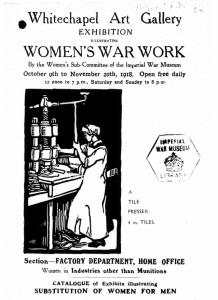
Screenshot of front page from Catalogue Of Women’s War Work Exhibition At Whitechapel Art Gallery 1918. Available from Archives Unbound.
The First World War had a revolutionary and permanent impact on the personal, social and professional lives of all women. Their essential contribution to the war in Europe is fully documented in this definitive collection of primary source materials brought together in the Imperial War Museum, London. These unique documents include charity and international relief reports; pamphlets; photographs; press cuttings; magazines; posters; correspondence; minutes; records; diaries; memoranda; statistics; circulars; regulations and invitations. Together these documents form an indispensable resource for the study of 20th-Century social, political, military and gender history.
- British Campaign in Mesopotamia, 1914-1918
The Mesopotamian Campaign deserves to be far better known than it is—both in terms of its impact on the war and the subsequent course of the history of the Middle East. This collection provides the opportunity to review the telegrams, correspondence, minutes, memoranda and confidential prints gathered together in the India Office Military Department on Mesopotamia. In 1914 the British/Indian Army expedition to Mesopotamia set out with the modest ambition of protecting the oil concession in Southern Persia but, after numerous misfortunes, ended up capturing Baghdad and Northern Towns in Iraq. Initially the mission was successful in seizing Basra but the British/Indian forces found themselves drawn North, becoming besieged by Turkish forces at Kut. After various failed relief attempts the British surrendered and the prisoners suffered appalling indignities and hardship. Fighting against Turkish forces continued right up to the Armistice. The conduct of the Campaign was subject to a Commission of Inquiry which was highly critical of numerous individuals and the administrative arrangements.

Screenshot from IOR/L/MIL/17/5/749. 25-11-14 to 1-3-15. IOR/L/MIL/5/748-767: Papers on Mesopotamia. 1914-1922. Available from Archives Unbound.
- Military Leaders of World War I: Official and Private Papers of Generaloberst Hans von Seeckt
The materials reproduced in this collection consist of letters and other papers of Generaloberst Hans von Seeckt, prominent German military strategist of the First World War. At various times he served on military missions to Turkey and China. After the First World War, as military head of the Reichswehr, he was considered the organizer and “father” of the army of the German Republic. - Industrialisation Mobilization in Britain and the Ministry of Munitions, 1915-1918
The standard reference source on the unprecedented industrial mobilization of an entire economy to fight the war of 1914-1918, this 12 volume set has previously only been available in a few select libraries with which the British government deposited copies. It is essential for anyone who wants to study the economics behind the First World War, the career of David Lloyd George and the process of state intervention in industry. - World War I and Revolution in Russia, 1914-1918
This collection documents the Russian entrance into the First World War and culminates in reporting on the Revolution in Russia in 1917 and 1918. The documents consist primarily of correspondence between the British Foreign Office, various British missions and consulates in the Russian Empire and the Tsarist government and later the Provisional Government.
Archives Unbound also contains a number of collections that allow you to explore events and issues stemming from or influenced by the First World War e.g.
- Afghanistan in 1919: The Third Anglo-Afghan War
- British Mandate in Palestine, Arab-Jewish Relations, and the U.S. Consulate at Jerusalem, 1920-1944
- Dublin Castle Records 1798-1926
- French Mandate in The Lebanon, Christian-Muslim Relations, and the U.S. Consulate at Beirut, 1919-1935
- Middle East Online: Arab-Israeli Relations, 1917-1970
- Northern Ireland: A Divided Community, 1921-1972 Cabinet Papers of the Stormont Administration
- Russian Civil War and American Expeditionary Forces in Siberia, 1918-20.
Further useful digitised primary source collections include the House of Commons and House of Lords Parliamentary Papers (sometimes referred to as UK Parliamentary Papers) which contains bibliographic records and searchable full text for papers printed between 1688-2014 and it also includes Hansard 1803-2005. Or the Churchill Archive which includes more than 800,000 pages of original documents, produced between 1874 and 1965, ranging from Winston S. Churchill’s personal correspondence to his official exchanges with kings, presidents, politicians, and military leaders. Or why not try some of the more thematic primary source databases that cover the period of the First World War, though it isn’t their primary focus, such as Empire Online (spanning the last five centuries this resource brings together manuscript, printed and visual primary source materials for the study of ‘Empire’ and its theories, practices and consequences) or Victorian Popular Culture which invites you into the darkened halls, small backrooms, big tops and travelling venues that hosted everything from spectacular shows and bawdy burlesque, to the world of magic, spiritualist séances, optical entertainments and the first moving pictures.

Slides relating to: The Great War. [Stereoscope]. The Bill Douglas Cinema Museum. Available through Victorian Popular Culture.
What’s in the Library’s own archives?
The University of Edinburgh holds world class collections, including rare books, archives and manuscripts, art, historical musical instruments and museum objects. The Centre for Research Collections (CRC) on the 6th floor of the Main Library is your gateway into these unique collections.
Since 2014 staff from the CRC have been contributing to Untold Stories, a blog that reveals the stories within our collections of people and events from the time of the First World War. Did you know that Edinburgh and Leith suffered its first ever air assault in 1916, by Zeppelins of the Imperial German Naval Airship Service? Or that John Buchan’s (1875-1940) close relationship with Britain’s military leaders and work for the War Propaganda Bureau made it extremely difficult for him to include any critical comments in his writings about the way the war was being fought, providing a completely false impression of what was happening at the Front? Or the story of Ernst Levin (1887-1975) a German-born neurologist who moved to Edinburgh with his family when the Nazi’s rose to power but had served as a surgeon for the German army in the First World War and had won Military Medical Medal for his heroism in the Battle of the Somme? Find out about these stories and more at Untold Stories.

Clockwise from top left: German field hospital (LHSA Acc15/001), Detail from the ‘puce-coloured’ front cover of ‘Blast’, issue 2, July 1915, in the A.H. Campbell Collection, Victory Medal – awarded to William Hunter (Coll-1146), Bomb damage to buildings near the Infirmary, 2 – 3 April 1916 (LHSA P/PL1/E/208).
The CRC were also involved in enabling the University’s Roll of the Fallen for the First World War to be searchable online, via the database University of Edinburgh: Roll of Honour, WW1. The full University of Edinburgh Roll of Honour was published in 1921 and begins with an introduction by the Principal, Sir Alfred Ewing, and a poem by Rudyard Kipling. Thereafter follows the Roll of the Fallen, Roll of War Service and, finally, Orders Decorations and Dispatches. The searchable online database currently only contains the Roll of the Fallen. You can view a digitised copy of the print version of the Roll of Honour via the Internet Archive. The CRC hold the original print version in their collections.
What research has been done already?
You can use bibliographic (abstracting and indexing) databases to search for journal articles, book chapters, book reviews, conference reports, theses, etc. This enables you to find scholarly research on the First World War and all events surrounding it.
Historical Abstracts would be a good database to start with for this area of research. Historical Abstracts provides a bibliographic reference to the history of the world (excluding United States and Canada) focusing on the 15th century forward. The database covers over 2,600 journals published worldwide, providing an incomparable research tool for students and researchers of world history. The database provides indexing of historical articles in over 40 languages, published from 1955.

Screenshot from Historical Abstracts, EbscoHost.
There are other bibliographic databases that would also be useful for this area of research e.g. America: History & Life, Arts & Humanities Citation Index, Bibliography of British and Irish History, JSTOR, etc. Take a look at the databases listed under History for more information. Why not also search DiscoverEd to see what books, articles and other material you can find in the Library related to the First World War.
What to watch?
You can use some of the Library’s moving image and video streaming databases to search for and view films, documentaries, interviews, plays, TV programmes, etc., on the First World War.

Box of Broadcasts (BoB) allows you to view or listen to previously recorded TV and radio programmes from over 60 stations, you can also record programmes yourself, create clips and create playlists. From documentaries such as World War I at Home, Lost Heroes of World War I, WWI: The Last Tommies, The First World War, The World’s War: Forgotten Soldiers of Empire, Home Front, World War 1’s Tunnels of Death and Churchill’s First World War to films, dramas and comedies such as Our World War, Gallipoli, All Quiet on the Western Front, A Farewell to Arms, Anzac Girls, Oh! What a Lovely War and Blackadder Goes Forth. And look out for the fantastic Peter Jackson documentary They Shall Not Grow Old which will be shown on BBC Two this Sunday and will be available to watch on BoB the next day.
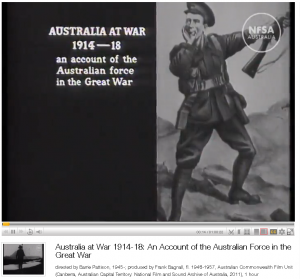 Academic Video Online is a multidisciplinary collection of videos that allows you to analyse unique and valuable content from over 500 producers and distributors around the world. With 1000s of videos already available on the site, around 400 new titles are added to the site every month. The site is easy to search and browse and while it does contain TV programmes and films from Britain it has more (than BoB) from the perspectives of Britain’s allies during the war, such as Canada (e.g. Stories of Courage, A Nation Soars), Australia (e.g. Lost in Flanders, Monash – The Forgotten Anzac, Australia at War 1914-18) and the United States (e.g. WWI: The First Modern War, World War 1: American Legacy).
Academic Video Online is a multidisciplinary collection of videos that allows you to analyse unique and valuable content from over 500 producers and distributors around the world. With 1000s of videos already available on the site, around 400 new titles are added to the site every month. The site is easy to search and browse and while it does contain TV programmes and films from Britain it has more (than BoB) from the perspectives of Britain’s allies during the war, such as Canada (e.g. Stories of Courage, A Nation Soars), Australia (e.g. Lost in Flanders, Monash – The Forgotten Anzac, Australia at War 1914-18) and the United States (e.g. WWI: The First Modern War, World War 1: American Legacy).
You can access BoB, Academic Video Online and other video streaming and moving image databases from Image and moving image databases.
Other resources
While the majority of digital resources mentioned are only accessible to staff and students at the University there are a large range of open access digital resources available to all. Here is just a small selection:
- World War One resources (from Edinburgh Libraries.)
- Experiences of the Great War (from the National Library of Scotland)
- First World War ‘Official Photographs’ (from the NLS)
- British First World War Trench Maps, 1915-1918 (from the NLS)
- Rolls of honour (from the NLS)
- Blighty and Sea Pie (from the NLS)
- First World War (from National Museums Scotland)
- World War One (from the British Library)
- First World War 100 (from the National Archives)
- First World War (from the Imperial War Museums)
- The Great War Interviews (from BBC)
- Remembrance (from BFI Player)
- Cinema of WWI (from BFI Player)
- 1914 on Film, 1915 on Film, 1916 on Film, 1917 on Film and 1918 on Film (from BFI Player)

Old College War Memorial. A memorial commemorating over 1,000 staff, students and alumni that fought in the First World War and Second World War. An extension was made in 1952 to include the names of fallen soldiers from the Second World War. The original memorial was unveiled on the 9th February 1923. © University of Edinburgh.
Access to library databases are only available to current students and members of staff at the University of Edinburgh.
Caroline Stirling – Academic Support Librarian for History, Classics and Archaeology
